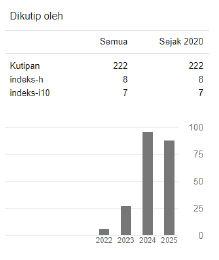The Lived Experiences of Senior High School Teachers in Teaching English and Language Arts during Pandemic Times
 https://doi.org/10.54012/ijcer.v3i2.236
https://doi.org/10.54012/ijcer.v3i2.236
 Abstract views: 1370
Abstract views: 1370
 PDF downloads: 314
PDF downloads: 314
Keywords:
Lived Experiences, Teaching English, Language Arts, Pandemic Covid-19Abstract
This transcendental or psychological phenomenological study aimed to unravel the lived experiences of senior high school teachers teaching English and Language Arts during pandemic times. Utilizing in-depth interviews, several themes emerged, encompassing effective online engagement strategies, innovative teaching approaches, empathetic teaching practices, student engagement challenges, technological and connectivity issues, and curriculum implementation struggles. The results imply that despite the teachers' challenges, they still see the silver lining in the advent of the new mode of teaching and learning, viewing it as a means of personal and professional growth. Additionally, this study contributes valuable insights that can pave the way for educational sectors to identify both progress and deficiencies in the educational process during these unprecedented times.
Downloads
References
Basinillo, A. R., Oracion, B. M., Magno, R., & Vea, L. (2019, August). Development of a model that Detects Student's Disengagement during an online Lecture presentation through eye tracking and/or head movement. In Proceedings of the 2019 International Conference on Information Technology and Computer Communications (pp. 59-65).
Bhattarai, P. (2020, September). English language teachers’ experience on online teaching amidst COVID-19. In Linguistic Forum-A Journal of Linguistics (Vol. 2, No. 3, pp. 20-25).
Cabal, J. H. (2017). Lived Experiences of English Teachers of Talaingod Manobo Students: Pedagogical Challenges in Focus. Tin-aw, 1(1), 1-1.
Cardine, S. (2008). Is education ready for YouTube. Center for Digital Education/Converge. Retrieved, 9, 10-13.
. Cipriano, C., Rappolt-Schlichtmann, G., & Brackett, M. A. (2020). Supporting school community wellness with social and emotional learning (SEL) during and after a pandemic. Edna Bennet Pierce Prevention Research Center, Pennsylvania State University.
Creswell, J. W., & Plano Clark, V. L. (2011). Designing and Conducting Mixed
Methods Research (2nd ed.).London: Sage Publications Ltd.
Dennen, V. P. (2007). Presence and positioning as components of online instructor persona. Journal of Research on Technology in Education, 40(1), 95-108.
Guskey, T. R., & Yoon, K. S. (2009). What works in professional development?. Phi delta kappan, 90(7), 495-500.
Khanal, P. (2020). Lived experience of online teaching during the COVID-19 pandemic: Implications for curriculum and teaching. Interdisciplinary Research in Education, 5(1-2), 89-102.
Kearns, L. R. (2012). Student assessment in online learning: Challenges and effective practices. Journal of Online Learning and Teaching, 8(3), 198.
Lester, S. (1999). An introduction to phenomenological research. Taunton UK,
Retrieved from: http:/www.sld.demon.co.uk/resmethy.pdf
Li, C., & Lalani, F. (2020, April). The COVID-19 pandemic has changed education forever. In World economic forum (Vol. 29).
Lukas, B. A., & Yunus, M. M. (2021). ESL Teachers' Challenges in Implementing E-learning during COVID-19. International Journal of Learning, Teaching and Educational Research, 20(2), 330-348.
Macintyre, P., Gregersen, T., Mercer, S. (2020). Language teachers’ coping strategies during the Covid-19 conversion to online teaching: Correlations with stress, wellbeing and negative emotions.Retrieved from: https://www.sciencedirect.com/science/article/pii/S0346251X20307120 #bib23
.
Mayer, R. E. (2014). Incorporating motivation into multimedia learning. Learning and instruction, 29, 171-173.
Morgan, B. (2018). The Lived Experience: A Study in Teaching Online.
Contemporary Issues in Education Research, 11(1). Retrieved from: https://files.eric.ed.gov/fulltext/EJ1175162.pdf
Moustakas, C. E. (1994). Phenomenological research methods. Thousand
Oaks, CA: Sage Publications
Munastiwi, E., & Puryono, S. (2021). Unprepared management decreases education performance in kindergartens during Covid-19 pandemic. Heliyon, 7(5).
Paras, N.E, Alvez, T, Perante, L, & Robosa, J. (2021). The Experiences and
Challenges Faced of the Public School Teachers Amidst the COVID-19 Pandemic: A Phenomenological Study in the Philippines. International Journal of Advance Research and Innovative Ideas In Education, 7 (1). 10.6084/m9.figshare. 14028833.v1
Pokhrel, S., & Chhetri, R. (2021). A literature review on impact of COVID-19 pandemic on teaching and learning. Higher education for the future, 8(1), 133-141.
Polkinghorne, D. E. (1989). Phenomenological research methods. In Existential-phenomenological perspectives in psychology: Exploring the breadth of human experience (pp. 41-60). Boston, MA: Springer US.
Saye, J. W., & Brush, T. (2002). Scaffolding critical reasoning about history and social issues in multimedia-supported learning environments. Educational Technology Research and Development, 50(3), 77-96.
Simamora, R. M. (2020). The Challenges of online learning during the COVID-19 pandemic: An essay analysis of performing arts education students. Studies in Learning and Teaching, 1(2), 86-103.
Smith, R. W., & Smith, K. A. (2020). Opportunities and Obstacles to Making Innovation a Priority in Education. Critical Questions in Education, 11(2), 167-178.
Tria, J. (2020). The COVID-19 Pandemic through the Lens of Education in the Philippines: The New Normal. International Journal of Pedagogical Development and Lifelong Learning. 1. ep2001. 10.30935/ijpdll/8311.
Zinger, J. (2020). Compassionate flexibility: Rethinking course policies and deadlines in the time of COVID-19.
Downloads
Published
How to Cite
Issue
Section
License
Copyright (c) 2024 Christian Jay O Syting, Jovelyn C. Amabao , Quennie Marie C. Battad, Christine Jofel Zoe A. Luarez

This work is licensed under a Creative Commons Attribution-ShareAlike 4.0 International License.









